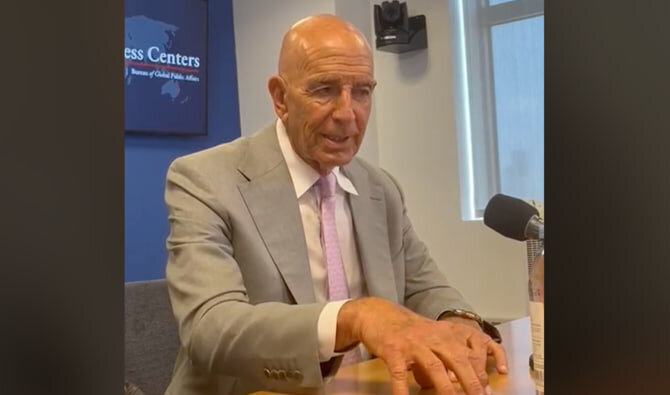Dramatic US threat to Lebanon: Surrender by force or else!

BEIRUT — In a post on X, US Special Envoy to Syria Thomas Barrack has claimed that his statements to The National were not intended to threaten Lebanon, but rather to praise the Syrian regime's “impressive strides”.
The US envoy had warned that if the government did not address Hezbollah’s weapons stockpiles, Lebanon will once again become part of the Levant (romanized as Bil?d al-Sh?m, i.e. historical name for Greater Syria).
“You have Israel on one side, Iran on the other, and now Syria is reemerging strongly and rapidly. If Lebanon doesn’t act, it will return to being part of ‘Bil?d al-Sh?m’ again.”
Barrack continued, “The Syrians say that Lebanon is their seaside resort. So we must act. I fully understand the frustration of the Lebanese people — and I share that frustration.”
He claimed that Syria is accelerating its efforts with unprecedented speed to capitalize on the historic opportunity created by the U.S. president’s decision to lift sanctions—guided by a clear and ambitious vision for the future.
The US envoy also claimed that the HTS-led Syrian regime wants nothing but coexistence and shared prosperity with Lebanon, claiming that Washington is “committed” to supporting this.
Barrack is expected to return to Beirut on July 23 to comment on the official Lebanese response to the U.S. proposal to disarm the Resistance front.
Reportedly, European diplomatic sources informed Lebanese officials that Washington was dissatisfied with Barrack’s calm approach during his recent visit, especially when he said, “The issue of Hezbollah is a Lebanese affair, and the Lebanese must deal with it.”
Analysts said that the US envoy appeared to be backtracking on his predecessor, Morgan Ortagus’ position, particularly as he made a distinction between Hezbollah’s political and military wings.
This prompted U.S. State Department spokeswoman Tammy Bruce to say, “Our position has not changed. Hezbollah is a designated terrorist organization, and we do not distinguish between its political or armed wings.”
Bruce said, “Ambassador Barrack has been very satisfied with the initial response by the Lebanese Government but now has noted that they’re working on details in this regard.”
The spokeswoman added, “We do not want to see Hezbollah or any other terrorist group in Lebanon recover their ability to commit violence and threaten the security in Lebanon or in Israel.”
Regarding Ortagus, an informed source warned that the Lebanese believed they had gotten rid of what they described as an “arrogant” woman, without paying attention to what she was preparing for.
Ortagus currently serves as senior political advisor to Dorothy Shea, the U.S. Acting Permanent Representative at the United Nations (former U.S. Ambassador to Beirut), where she is doing everything necessary to make amendments to the mandate and powers of UNIFIL, ahead of its renewal next August.
It is worth noting that the Israeli enemy, through its large lobby within the United Nations, is pushing to prevent the renewal, on the pretext that UNIFIL is not carrying out the tasks assigned to it.
Observers seriously warn that ending UNIFIL’s mission would mean an explosion on the border between Lebanon and occupied Palestine.
While Paris claims its relentless efforts to maintain UNIFIL in southern Lebanon, Washington is leaning toward using its veto to block the extension.
This would effectively end UNIFIL’s mandate, not just reduce its strength, especially if funding is unavailable (following Trump’s decision to cut the budget for the so–called peacekeeping forces worldwide).
The Lebanese government had officially requested an extension of UNIFIL for an additional year, insisting on not modifying its mission, either in terms of personnel or mandate.
Meanwhile, the Departments of State and Justice held a meeting with Europol - officially the European Union Agency for Law Enforcement Cooperation - regarding combating Hezbollah’s activities.
Participating in the meeting were officials from the Treasury Department; members of the Law Enforcement Coordination Group (LECG); representatives of law enforcement agencies; prosecutors; and financial experts from approximately 30 countries.
Representatives of the so-called US National Counterterrorism Center (established by the US administration and Europol in 2014) also attended, claiming to enhance international coordination among world governments to combat Hezbollah’s activities.
The State Department statement acknowledged that Hezbollah remains a serious threat, maintaining a presence abroad and possessing the capability “to carry out attacks without warning against targets worldwide.”
The statement also noted Hezbollah’s “precarious” financial situation, hence it “may seek to increase its fundraising and equipment procurement activities, particularly in the Western Hemisphere, Africa, and other regions.”
Leave a Comment